
A novel study led by Prof. Mira Barda-Saad and her research team at the Goodman Faculty of Life Sciences at Bar-Ilan University has unveiled a novel method to rejuvenate natural killer (NK) cells in the fight against cancer. The study, published on the cover of The EMBO Journal, addresses a critical challenge in cancer immunotherapy—NK cell exhaustion.
Natural killer cells, a key component of the immune system, are crucial for identifying and destroying cancerous and viral cells. In recent years, the landscape of cancer treatment has been transformed by the rise of immunotherapeutic strategies, such as the Chimeric Antigen Receptor (CAR) approach. This method involves extracting patient cells, modifying them genetically in a laboratory to enhance their ability to combat cancer cells, and then reintroducing them into the body.
Recently, however, it was discovered that the lymphocytes, either T cells or NK cells, including “engineered” NK cells, can become fatigued from continuously battling tumors and subsequently lose their function. To bypass this process, Prof. Barda-Saad’s research team identified the underlying causes of NK cell dysfunction and developed a novel solution using nanoparticles to restore the vitality of these cells directly within the patient.
These nanoparticles, capable of targeting and silencing negative regulators, restore NK cell activity directly within the patient’s body, bypassing the need for cell extraction and genetic modification.
NK cell dysfunction can occur in two ways:
- During training, in which they undergo a training process in the immune system. If this process is disrupted, it can lead to NK cells that don’t function correctly.
- In the tumor microenvironment, when NK cells encounter a tumor, they are constantly stimulated.
If this stimulation is excessive and prolonged, it can lead to “exhaustion” where the NK cells become less effective at fighting cancer. In essence, NK cell dysfunction can arise from inappropriate signals they receive during their development (defined as “anergy”) or from the harsh conditions they face while combating tumors (defined as “exhaustion”). Both NK populations—”anergic” and “exhaustion”—are dysfunctional and these dysfunctional processes have not been thoroughly characterized until now.
Prof. Barda-Saad’s group analyzed anergic and exhausted NK cells from both their training phase and tumor microenvironment, finding that they are similarly dysfunctional. They identified two key factors contributing to this dysfunction: the enzyme DGK alpha and the transcription factor Egr2.
Experiments in three-dimensional tissue culture and in-vivo mice models have shown that nanoparticles, acting as a platform for drug delivery, can reprogram the dysfunctional natural killer cell population. After the research group introduced nanoparticles that silence the two negative regulators, the killer cells returned to their normal function and efficiently killed cancer cells.
These promising findings, obtained in animal models bearing aggressive pancreatic cancer, could pave the way for the development of highly effective treatments against solid tumors using an immunotherapeutic strategy, offering hope to patients and professionals in the field.

